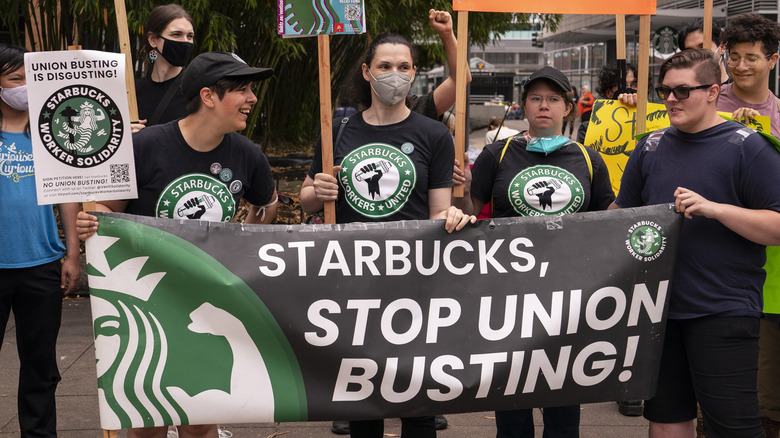Starbucks' Anti-Union Efforts May Be Working. Here's What We Know
Three Starbucks locations are looking to dissolve their unions and have recently filed decertification petitions to the National Labor Relations Board. The three locations are the Starbucks Reserve Roastery of New York City and two regular Starbucks locations in Buffalo and Rochester, New York (via Restaurant Dive).
One Starbucks Workers United representative told Quartz that the first of these decertification petitions was "caused by Starbucks' illegal union-busting campaign, plain and simple." Similarly, the union also expects the newest petition "to be dismissed over the company's alleged violations of labor law," as reported by Restaurant Dive.
These petitions are a sign that Starbucks' alleged union-busting efforts may be working. Since stores have started unionizing, Starbucks has allegedly tried to curb those efforts and stall further talks through methods such as walking away from negotiations. The company is also said to have terminated employees associated with unions while conversely granting additional privileges to new, non-union hires. Decertification petitions are only allowed to be filed a year or more after the original certification, with proof that roughly a third of the staff supports an effort to dissolve its union.
Various sources have criticized Starbucks
Back in March, Starbucks' union-busting backfired on it in a major way, but the company's anti-union tactics have supposedly been ramping up in the last few months. Former Starbucks CEO Howard Schultz was recently grilled over numerous, potential labor-law violations by the Senate labor committee. During that hearing, Schultz denied any wrongdoing, as reported by CNBC, but one lawmaker specifically accused Schultz of trying to delay negotiations with unions, hoping that they would instead give up over time.
And a few days after the Senate hearing, Starbucks was yet again in the headlines for firing Alexis Rizzo, a worker who helped created Starbucks Workers United and spearheaded its cause. Starbucks supposedly told Rizzo it fired her for being late to work multiple times, but Starbucks Workers United has claimed this was actually retaliation against Rizzo. Now, from the viewpoint of pro-labor activists, it seems Starbucks' methods might have also influenced the decision of some workers to file decertification petitions.

